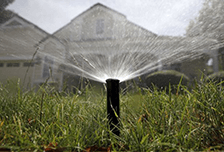- Home
- How do I...?
- Learn About
- Irrigation and Conservation
Irrigation
CFPUA gives customers the option to install a separate water meter for irrigation.
A separate irrigation meter allows customers to be billed CFPUA’s special irrigation rate for water used outdoors and can help you save money and practice smart watering.
Want to get an irrigation meter installed? Visit our Applications and Forms page and fill out the “Meter Set Request” form.
Irrigation Rate
Having a separate meter for outdoor water use can save customers money on their CFPUA bill, especially if they have large irrigation needs.
This is because for every gallon of water used, customers are also charged for sewer usage. However, if customers have a separate irrigation meter, CFPUA charges them only the special irrigation rate for gallons used outdoors – with no corresponding sewer charges.
Let’s do the math:
- As of July 1, 2025, CFPUA customers are charged $5.16 per 1,000 gallons of water used.
- On the sewer side, customers are also charged $5.72 per 1,000 gallons.
- That’s a total of $10.88 per 1,000 gallons.
- CFPUA’s current irrigation rate is $7.73 per 1,000 gallons, meaning customers with separate irrigation meters would save $3.15 per 1,000 used outdoors.
It is important to note that these figures do not include fixed water and sewer charges, meter set charges, or fees associated with maintaining a backflow preventer. CFPUA advises customers to review our latest Rates and Fees Schedule when deciding whether to install a separate irrigation meter.
Why Does CFPUA Charge More for Irrigation than indoor water use?
Irrigation makes up a significant portion of customer demand for water, particularly during warmer months.
In the summer, water demand across CFPUA’s system can spike by as much as 50%. This increased demand also increases operational needs across the water system, and can accelerate the need for rehabilitation, replacement, and expansion of infrastructure.
Like many water utilities, CFPUA charges a special irrigation rate to fairly charge customers the costs associated with providing this service.
WATER CONSERVATION
Why save water?
Water conservation saves money and helps the environment by properly nourishing plants and reducing runoff. Most importantly, it helps ensure our community’s water system has enough capacity year-round.
Up to 50% of water used outdoors at the average home is wasted due to improper watering. That means half of every dollar you spend on irrigation could be evaporating.
The average lawn needs just an inch of water per week – including rainfall – to stay healthy. Try this trick from the U.S. Environmental Protection Agency to avoid over-watering:
Place a few empty tuna cans around your lawn while watering and measure how long it takes your sprinkler to fill them with a half-inch of water. Then, try watering that amount of time twice a week, gauge how your landscape responds, and adjust based on weather conditions.
Water-Saving Tips
|